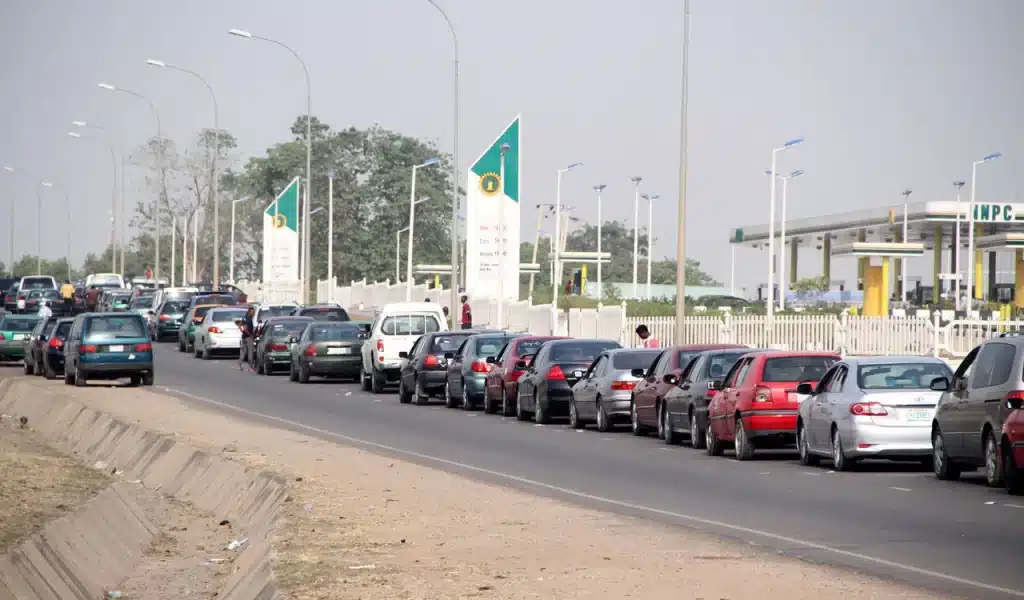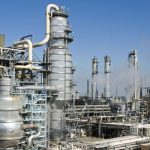Fuel prices have skyrocketed in Lagos, creating a scarcity that has disrupted daily life and led to an unprecedented increase in transportation costs.
As filling stations across the city struggle to meet demand, residents are left grappling with the financial burden of the escalating fuel crisis.
Join our WhatsApp ChannelFuel Scarcity Grips Lagos
In various parts of Lagos, including Ikoyi, Ikeja, and Maryland, fuel scarcity has become a harsh reality. At NNPC stations, such as the one on Bariga road in Bariga Market Yaba, Lagos, queues stretch for miles, reflecting the desperation of motorists. A litre of fuel now costs N855 at this station, yet many cannot purchase it.
Daniel Johnson, a businessman, described the situation as dire: “The fuel queue at NNPC located at Bariga Market stretched to the two sides of the road, getting to the main road leading to Gbagada.”
This scarcity has forced many filling stations in Lagos and even Abuja to shut down entirely. Prime Business Africa findings reveal that public buses and private car owners are scrambling to find fuel, leading to long queues at the few stations still operating.
In Ikeja, Maryland, and Ikorodu, the price of petrol has soared to as high as N1,000 per litre, leaving both commercial drivers and passengers in a difficult position.
Transportation Costs Skyrocket
The spike in fuel prices has had a ripple effect on transportation costs across Lagos. Commuters are now facing significantly higher fares, further straining their budgets.
A commuter at Bariga Market also voiced his frustration: “Everyone will bear the cost. Anyone that needs my services will also bear the pain of my transportation fare increase.” His sentiments are echoed by countless others who rely on public transport to get around the city.
READ ALSO: Top 10 African Countries With Cheapest Fuel Prices In July 2024
Alice Emeka, an accountant, shared her experience: “I was told the bus fare had increased to N300 when I got onto the bus. Other passengers in the bus complained that this is a motive to increase the fare price by drivers. The extra fare can still be used for something else which is why I am hurt.”
This sudden jump in fares has caught many off guard, forcing them to rethink their daily commute.
Impact on Small Businesses
The fuel crisis is also taking a toll on small businesses, which are struggling to cope with the rising costs.
A food seller in Bariga Market, Iya Adura as she is fondly called, expressed her dismay: “If transporters can charge this high, I would start selling a spoon of rice for N1,000.”
Her frustration is a reflection of the broader economic challenges facing small business owners, who are now forced to pass on the increased costs to their customers.
Looking Ahead
As the fuel crisis continues to unfold, residents and businesses alike are left to navigate the challenges it presents. The long queues, soaring prices, and transportation woes are just the beginning.
The impact on daily life in Lagos is likely to persist until a sustainable solution is found.
For now, Lagosians are left to lament the sharp rise in fuel prices and the ripple effects it has unleashed across the city. The coming days will reveal whether the situation will stabilise or if further disruptions are on the horizon.
Emmanuel Ochayi is a journalist. He is a graduate of the University of Lagos, School of first choice and the nations pride. Emmanuel is keen on exploring writing angles in different areas, including Business, climate change, politics, Education, and others.


















Follow Us